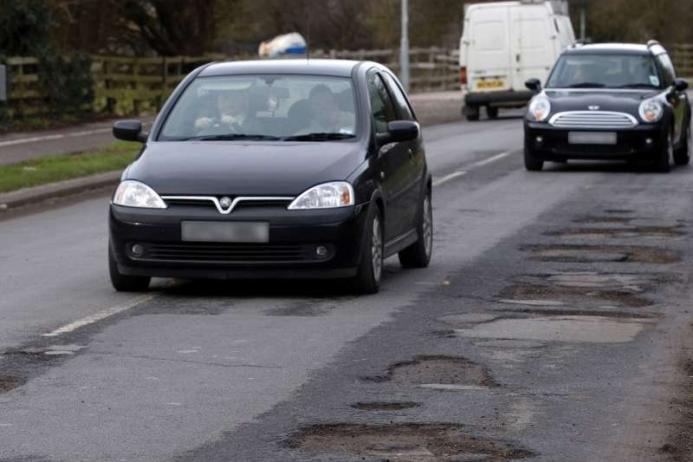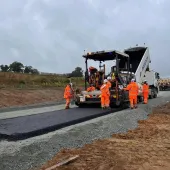ALARM survey 2023: No respite for local roads
Annual Local Authority Road Maintenance survey highlights worsening conditions and rising costs
THIS year’s Annual Local Authority Road Maintenance (ALARM) survey makes bleak reading, with worsening carriageway conditions and mounting costs set to spell more misery for road users.
The ALARM survey, published today (21 March 2023) by the Asphalt Industry Alliance (AIA), reports that local authority highway teams in England and Wales only received around two-thirds of what they needed to stop their local roads from further deterioration and that more than £14 billion is now needed to fix the backlog* of carriageway repairs.
Despite the small increase in overall highway maintenance budgets reported, less is being spent on the carriageway itself, and rising costs due to inflationary pressures mean engineers have reported being forced to postpone or cancel road schemes to make savings.
The data show that in the last year, the gap between what local authorities received and what they said they would have needed to keep roads to their own target conditions and prevent further decline is now £1.30 billion – a jump of more than 20% on last year’s figure and the highest amount reported in 28 years of successive ALARM surveys.
Moreover, the cost of fixing the backlog of carriageway repairs is reported to have increased by a further 11% on last year’s record figure to a new high of £14.02 billion – the equivalent of £68,000 per mile of local road in England and Wales – and would take an average of 11 years to complete.
AIA chair Rick Green said: ‘Highway engineers can only do so much with the resources they are given and should be applauded for the steps they take to keep roads safe.
‘Potholes and the condition of our local roads remain key issues for the public and the Chancellor went some way to recognizing this in his Spring Budget. But the additional £200 million one-off payment for local roads in England, whilst welcome, is just not enough. It represents around 20% of the average shortfall in English local authorities’ annual budgets and will do little to improve overall structural conditions and stem further decline.
‘We all appreciate that there are difficult choices to make with demands and pressures on the public purse coming from every area, but not investing in local road maintenance only leads to worsening conditions, which impact on other locally provided public services, a rising bill to fix the problem and more road user complaints.
‘To really improve conditions and create a safe, resilient and sustainable network, what’s needed is a longer-term funding horizon from central government with more highway budget ring-fencing. This would help local authority engineers to plan effectively and implement more efficient works to protect and enhance the resilience of the local road network.’
This year’s ALARM survey received a record number of responses from 75% of local authorities in England and Wales. It reports local road funding and conditions based on information provided directly by those responsible for its maintenance.
The findings of ALARM 2023, which relate to the 2022/23 financial year, show that in England and Wales:
Local authorities would have needed an average of an extra £7.7 million each last year just to reach their own target road conditions
It would now cost £14.02 billion to tackle the backlog and bring the network up to a standard from which it can be maintained efficiently and cost effectively going forward.
Whilst half (51%) of local roads are reported to be in good structural condition, the remainder (more than 100,000 miles) could, without appropriate maintenance measures, continue to deteriorate to the point of needing to be rebuilt within the next 15 years
18% of the network (almost 37,000 miles) is already assessed as having less than five years’ structural life remaining
One pothole is filled the equivalent of every 22 seconds
Roads are only resurfaced on average once every 116 years.
Commenting on the findings of the survey, Local Government Association transport spokesperson Cllr David Renard said: ‘Councils work tirelessly to repair our local roads, which are the bedrock of our economy – vital for businesses and for ordinary people going about their day-to-day lives. It is, therefore, alarming that, due to soaring inflation and historic funding cuts, councils’ repair backlog has grown, and this has become increasingly challenging to tackle.
‘To improve the condition of our roads, the Government should provide a funding increase for councils, including meeting new inflationary pressures. This would help councils focus on long-term investment in existing roads, delivering preventative maintenance and reducing the occurrence of potholes in the first place, which are more expensive to repair.’
Nicholas Lyes, head of roads policy at the RAC, said: ‘The [survey] findings make for terrible reading and will come as no surprise to anyone who is forced to endure our pothole-plagued roads on a daily basis. It’s incredible that council funding is now so inadequate that almost one-in-five roads have under five years’ structural life left. This means the gap between the money councils have and what they need is widening.
‘We’ve long campaigned for a more sustainable form of funding that allows councils to replace roads that are at the end of their useful lives. Sadly, everyone but the Government appears to recognize this. This is why the Government’s eternal emphasis on filling potholes is so frustrating as it’s simply treating the symptoms, and not dealing with the root cause. As a nation so dependent on road transport, we must not let this go on.’
Mr Lyes’ counterpart at the AA, Jack Cousens, said: ‘The condition of some of our roads is an international embarrassment and it needs a concerted effort and investment to halt the decline.
‘Half of councils have already cut back spending on road maintenance. Astonishingly, it now takes more than 100 years to fully resurface the streets and the cash needed to salvage the infrastructure has spiralled to the extreme. National and local politicians have failed to look after their biggest and most important asset for years.
‘Years of sticking plaster solutions haven’t solved the problem, so it’s now time for serious investment and serious action.’
The full ALARM survey can be downloaded from: www.asphaltuk.org
* The backlog describes the amount that would be needed – as a one-off catch-up cost – to bring the network up to condition that would allow it to be managed cost effectively and sustainably going forward as part of a proactive asset management approach










